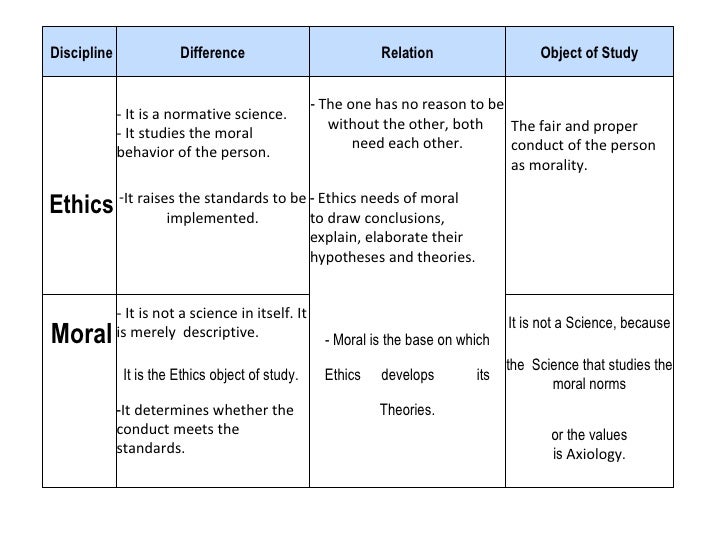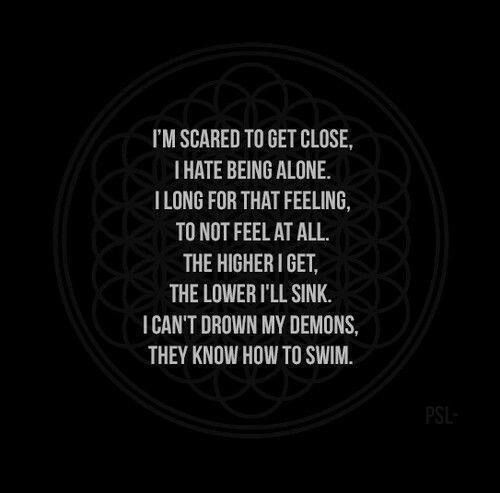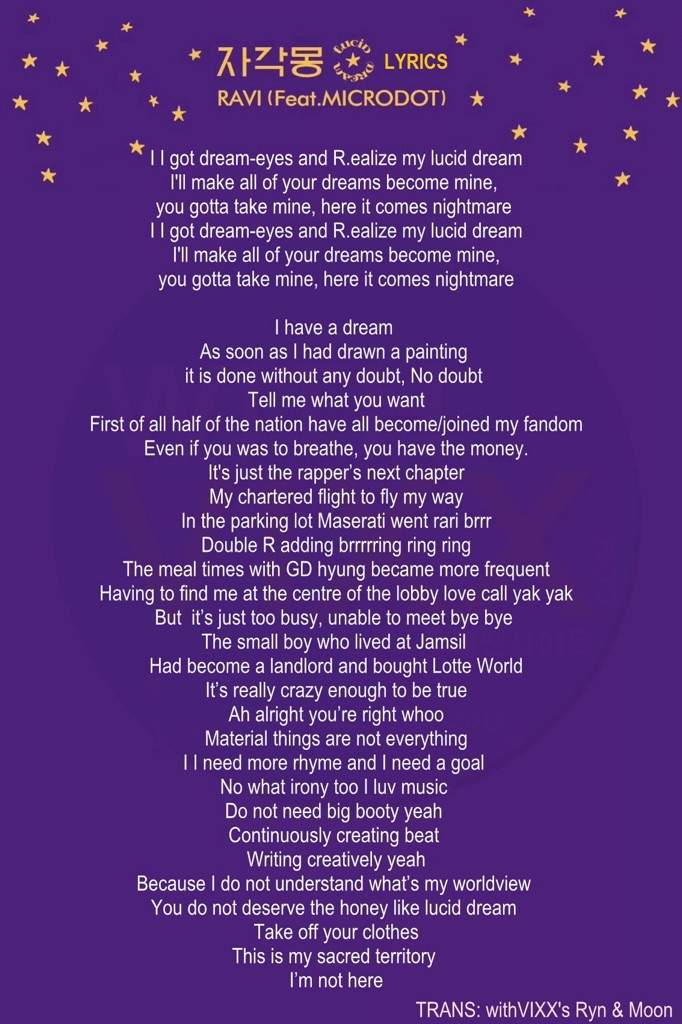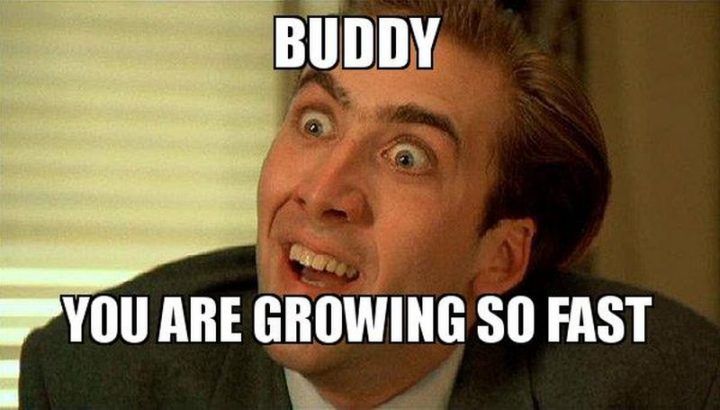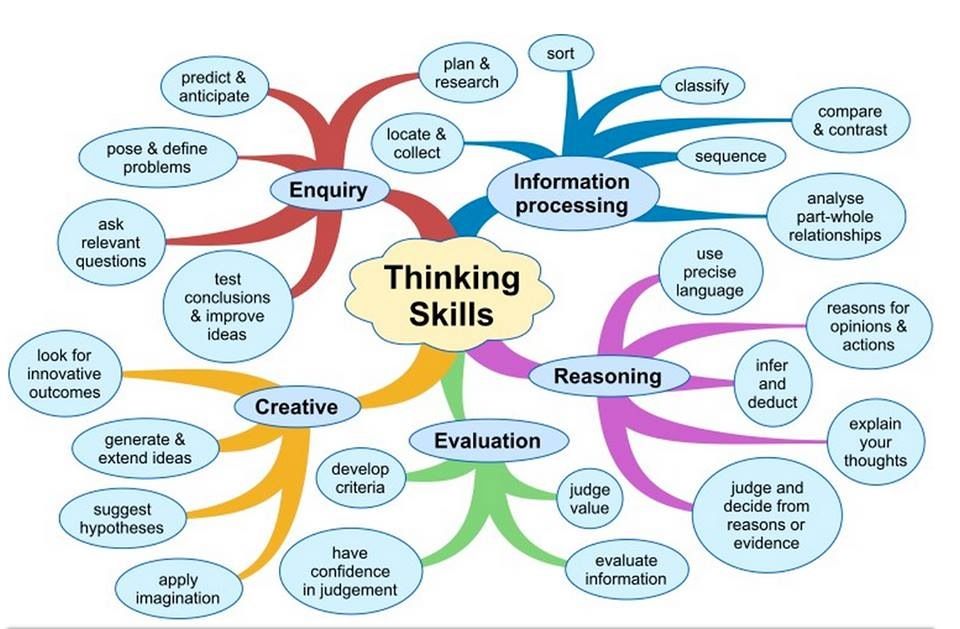How do i choose between my head and heart
When Your Head and Heart Disagree
Your heart’s passion and your mind’s wisdom are great gifts. But what happens when your emotional and logical sides are at odds?
This can be particularly poignant in romantic relationships. For example:
Heart-head conflicts can feel paralyzing. Wait too long to decide and the opportunity may pass, perhaps forever. Rush in too soon and you may overlook crucial information.
Do you tend to trust your intellect or your emotions? Here are two online quizzes that may help you identify which is primary for you: Quiz 1,Quiz 2
Your heart can encourage you to take risks. Without risk, growth is impossible. Your heart can lead you to passion and beauty which logic could never predict. Yet sometimes when the heart wants what it wants, denial and impulsiveness can override sound judgment. The heart can be idealistic yet it can also be naive, casting off rational thinking.
Your head can anticipate consequences that your heart may miss or minimize. Logical thought and perspective can alert you to unwise risks, protecting you from possible harm. Yet the mind can also be a naysayer, serving up self-doubt and cynicism that may keep you from adventures that could prove to be your most cherished. Often-times our thinking can be pedantic or rigid and lead us to overlook what matters most.
Youll never find peace of mind until you listen to your heart. George Michael
If you are stuck, take a moment and think about which sense you tend to embrace more naturally: feelings or thoughts. When you feel stuck, it may be good idea to consult your lesser-used inner ally.
For example, if you tend to favor logic, let yourself tune into your feelings. Remember, feelings are not facts. They dont have to make sense. Rather, feelings are information from a less linear aspect of yourself.
Emotional intelligence is every bit as important as mental intelligence. Try just sitting and noticing what you are feeling.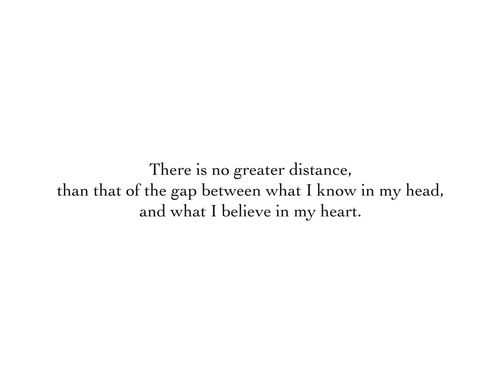
If you find it hard to identify feelings, referring to a feeling wheel, list, or chart may help.
On the other hand, if you usually go straight to feelings, let yourself tune into your thoughts. Observing thoughts may feel much different than consulting your feelings. You have a mind for a reason. Follow the path of your thinking. While you do so, let your feelings just pass by.
There is only one quality worse than hardness of heart and that is softness of head. Theodore Roosevelt
It may also be helpful to take stock of your history. Think about times when your thoughts may have led you astray. Then think about times when your thoughts served up wisdom which may have changed your life or protected you from harm.
By the same token, think about times your heart has led you down the wrong path. Then recall times when your heart led you to adventures of a lifetime, taking risks and pursuing passions that came to define who you are.
When you feel stuck in a head-heart conflict, perhaps the answer is not to choose between head and heart but instead take from the best each has to offer.
Our minds generate between 12,000 and 70,000 thoughts a day as many as two billion thoughts a lifetime. Yet a large number of our thoughts are meaningless, inaccurate or nonsensical. One study suggested that 95 percent of our thoughts are repetitive, 80 percent of our thoughts are negative, and 85% of what we worry about never happens.
So how can you touch into your deepest wisdom among all this automatic thinking?
Your may experience your deepest wisdom as an adult self, a self-cherishing perspective, your wise voice, or some other term. It is often a voice of calm, a voice that may speak more softly than most of what rushes past us served up by busy minds. It is a voice of reflection, of experience. It may be a voice you internalized from a wise parent, elder, teacher or role model.
Your deep wisdom watches out for you, not with hysterics or Henny Penny warnings, but by offering the long view. Your wise brain sees potential consequences and asks you if that is what you really want. Remember this voice. Make note of how it sounds and how it feels in your body.
Your wise brain sees potential consequences and asks you if that is what you really want. Remember this voice. Make note of how it sounds and how it feels in your body.
Then, turn to your heart. Our hearts beat roughly 115,000 times a day 3 billion beats in our lifetimes. The heart emits an electrical field 60 times greater in amplitude than the activity in the brain and an electromagnetic field 5,000 times stronger that of the brain.
Take a few moments perhaps even putting your hand over your heart if you like to listen to your deep heart voice. This may be a presence you call spirit, the undefended heart, the voice of love, or soul. This is beyond any particular emotion; it is the source of your emotions.
Only do what your heart tells you. Princess Diana
Like the wise brain, your deep heart may feel like a deep, slow moving river. This heart is guided by your values. It knows right from wrong, not in a moralistic sense but as in what is right and wrong for you. The deep heart sometimes whispers, other times speaks with authority.
The deep heart sometimes whispers, other times speaks with authority.
When you have an head-heart conflict, try fostering a conversation between the wise brain and deep heart. You can do this by visualizing it, writing or speaking a dialogue, even writing with both hands, using the dominant hand to write the minds voice and your non-dominant hand to speak your heart. Let it flow. Dont edit or judge. See what emerges. Take your wise brain and deep heart with you on a walk or run, and just listen.
If you have made a list of pros and cons about a decision facing you, go down the list and tune in your deep feeling voice. Then do so again consulting your wise mind. Listen, as you read, for any advice or wisdom each voice may offer.
When it comes to romance, what to do about head-heart conflicts?
If you doubt your partner is a good long-term match despite great chemistry, ask yourself:
- How will I feel a year from now if I havent moved on?
- Will I regret staying and thereby delaying finding someone with whom I could have it all?
- Are my doubts based on evidence, such as things in past relationships which havent worked for me?
Trust your gut, as people advise. Whether you experience gut as intuition or a physical sense, for many it is a deep knowing that is not necessarily linear or logical. We know something but we dont know why or cant explain how we know. Sometimes the gut saves us and guides us. Sometimes, as when feeling anxiety or depression, it may be hard to differentiate between the guts intuition and anxious thoughts or depressed moods.
Whether you experience gut as intuition or a physical sense, for many it is a deep knowing that is not necessarily linear or logical. We know something but we dont know why or cant explain how we know. Sometimes the gut saves us and guides us. Sometimes, as when feeling anxiety or depression, it may be hard to differentiate between the guts intuition and anxious thoughts or depressed moods.
If you are with someone who has everything youve wanted but you dont feel a romantic connection, ask yourself:
- Am I trying to force something here out of loneliness, fear I wont find someone, or fear of hurting the other person?
- Am I falling victim to shoulds when love is not a feeling we can force to happen?
- Am I being too critical, perhaps out of fear or unresolved grief from a past relationship loss?
- Can I imagine any real person who would be good enough for me right now?
Love is either present or it isnt. If it is not present, perhaps it is time to let a relationship go or give yourself some time before making any deeper commitment.
If you are pursuing someone who is ambivalent or unavailable, ask yourself why.
Are you afraid of being alone? Do you see this person as the solution to all your problems? No one other than yourself can make you feel whole. Fantasy may befun but the world is full of wonderful, available partners. You deserve to have someone who wants you as much as you want them.
Is it possible that a partner who is ambivalent is simply afraid and needs time to work their issues before being able to commit to you? If so, you have the choice to stay and see what happens, or to take your leave, perhaps inviting the other person to contact you if or when they work things out. Either way you no longer feel like the victim.
If you discover disturbing aspects to your partner such as an untreated addiction, a record of lying, or a checkered relationship history, pay attention. If you have a history of seeking relationships with such issues, you need a compelling reason for you to stay or you are likely to repeat an unhappy history.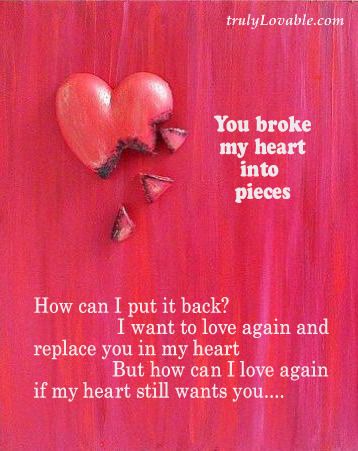
Assess whether your partner is willing and committed to getting help; whether he or she takes responsibility for his or her past and challenges. It is possible your partner may be a diamond in the rough, but you owe it to yourself to keep your eyes open. What do you want right now? What are the long-term consequences? Maturity means balancing both.
In matters of love, being either cold-hearted or hard-headed is unlikely to lead to a satisfying relationship.
Perhaps the best approach is to be hard-nosed about being soft-hearted.
Copyright Dan Neuharth PhD MFT
How to Decide Whether to Listen to Your Heart or Your Head
After my class on honing intuition last week, a participant asked me the following question—
In my work-life, I’m having trouble finding any intuition. I don’t like my job very much, but my gut isn’t telling me what to do about it. (Or, if my gut is speaking, I am avoiding it because it’s too scary to listen to.) So I feel like I am making decisions based on logic alone— making long lists of pros and cons, getting stuck thinking and thinking and thinking— rather than integrating my mind and my body.
If the pros and cons of a decision are tied, should intuition trump logic? Should intuition be THE determining power?
Here’s my response to her—
It seems like another way of asking this question is— Should I listen to my gut or my heart or my head? Which is most important?
The problem is, trying to choose between your gut and heart and head can make you feel stuck in a trap. The truth is, your gut and heart and head are all essential. You need to listen to all of them.
Intuition is a process of reasoning in which you listen to your full self, not just your thinking-head or your feeling-body.
If you only consider your gut or your heart or your head, you’ll miss out on a lot of important information. You’re apt to not feel in alignment about the path you choose.
If you work to find a decision that your gut, heart, and head are in alignment with, you will feel a sense of all the lights turning on in your body. Like that carnival game where you hurl a huge hammer down onto a metal button and, if you’re lucky, the ball shoots up to 100.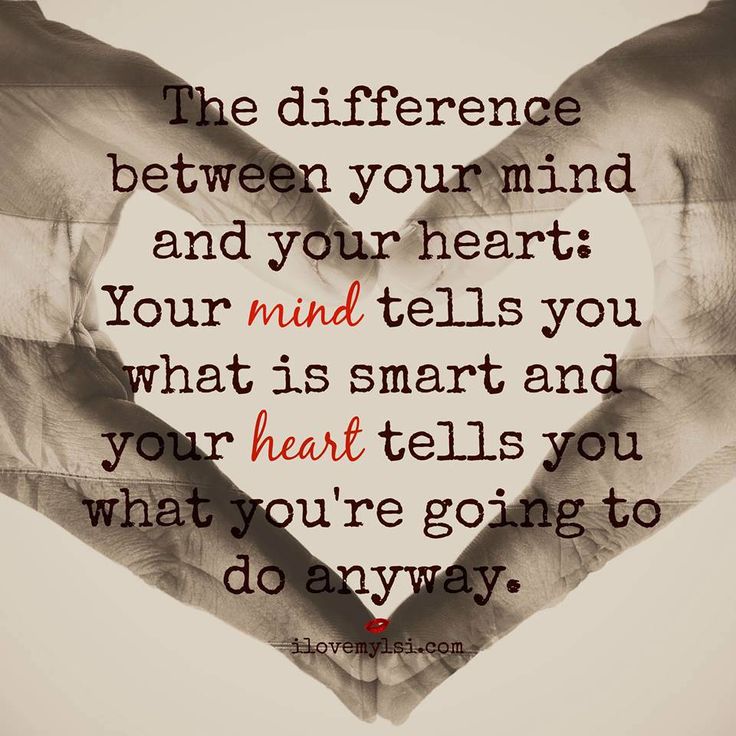 “Ding! Ding! Ding! Ding!”
“Ding! Ding! Ding! Ding!”
Deep down in your gut and heart, you may know that you need to make a change, but you avoid listening because it feels really scary.
You might need to let go of something that’s been important to you or that you’ve invested a lot of yourself in. You might not know how people will respond. The unknown can be scary.
But what can be even scarier is to consider what could happen if you don’t pay attention now. What if you go down a path that is not aligned with what your gut and heart know you need, and you finally wake up ten years from now? The feeling of having missed out on so much of your life, the work it would take at that point to change course— Is the risk of all this worth avoiding the scary stuff now?
So, what do you do if your gut and heart are saying one thing, but your head is coming up with all sorts of reasons not to go down that path?
Our heads are programmed to keep us safe, to think of all the reasons why our guts and our hearts are wrong.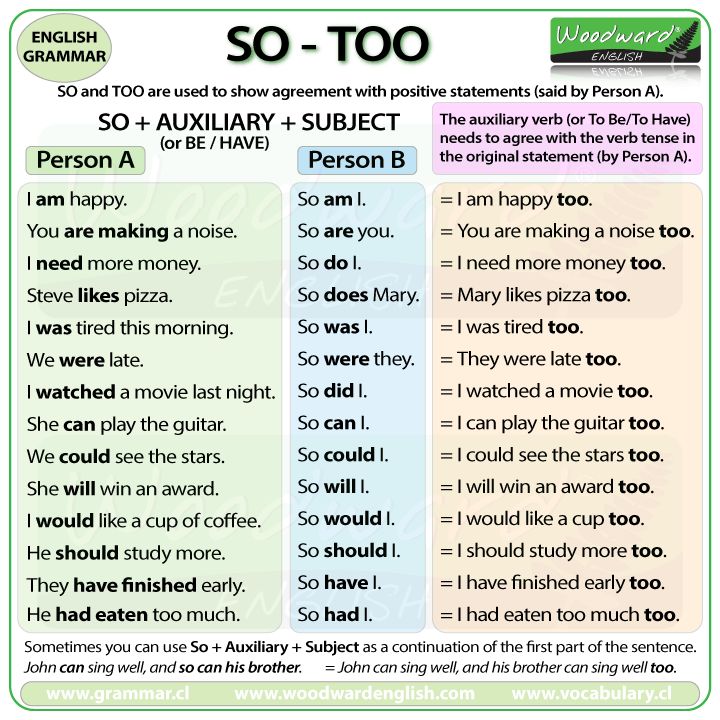 I call the part of your mind that comes up with all the what-ifs and yeah-buts the Voice of Doubt. Any time you have a call that will take you into the unknown or asks you to let go of something that’s been important to you, the Voice of Doubt will appear.
I call the part of your mind that comes up with all the what-ifs and yeah-buts the Voice of Doubt. Any time you have a call that will take you into the unknown or asks you to let go of something that’s been important to you, the Voice of Doubt will appear.
To soothe your inner Voice of Doubt, you need to learn how to respond to it with compassion, understand what it needs, and take steps to meet your many needs while also following your heart. (You’ll learn how to soothe your inner Voice of Doubt in the final class in our free series, Getting Clear on What Next.)
Rather than choosing between your gut or heart or head, I invite you to host a conversation between the three.
Try this now—
Write down a specific question you’re asking about what’s next in your life. Then, ask your gut what it has to say about the questions, and write down what it tells you. Do the same with your heart and your head.
Once you’ve listened to what each has to say, go back to your gut and heart and head. Ask the same question, and write down what each has to say. You can repeat this inquiry process several times until eventually, you come to a place where either the three are aligned or you have a new question to grapple with.
Ask the same question, and write down what each has to say. You can repeat this inquiry process several times until eventually, you come to a place where either the three are aligned or you have a new question to grapple with.
You can gather more information by doing research, asking people you trust your question, or practicing asking yourself your guiding question every day. (You’ll learn more about how to gather this information from other people in the third class in our series.)
If you keep paying attention, over and over and over again, to your gut and your heart and your head, you’ll be equipped to make wise decisions that take into account the fullness of who you are.
It takes courage (the ability to speak your heart, even in the face of fear). But, truly, you can do it.
Please share your thoughts in the comments section below.
Much love,
"Listen to the heart" or "turn on the head"? How intelligent is a reasonable person
Have you ever thought about how people make decisions? Small and important, simple and complex, familiar and unusual - how do we come to them?
In everyday life, we talk about at least two types of decisions: about reasonable ones, made "in a sober head", "cold mind" - and about emotional ones, taken "in the heat of the moment" or "at the call of the heart". What is behind these temperature and body metaphors? Do we really "think" not only with the head, but also with some other places? How many ways are there to make decisions? And most importantly - which of them are more effective? All these questions have long been of concern to psychologists. The authors of the PhD in Psychology telegram channel talk about what they have managed to learn over the past half century in a special series of texts. The first will focus on ideas and experiments 1960-80s.
What is behind these temperature and body metaphors? Do we really "think" not only with the head, but also with some other places? How many ways are there to make decisions? And most importantly - which of them are more effective? All these questions have long been of concern to psychologists. The authors of the PhD in Psychology telegram channel talk about what they have managed to learn over the past half century in a special series of texts. The first will focus on ideas and experiments 1960-80s.
First, let's talk about you. You are an adult, independent, intelligent person, otherwise why would you read this blog. Remember, the Pythia in The Matrix quoted the maxim inscribed on the temple of Apollo at Delphi (where, in fact, the original Pythia prophesied): "Know thyself"? How well do you know yourself? Answer this question:
How do we think about how we think?
Numerous studies show that people can almost always explain their thoughts, feelings, and actions.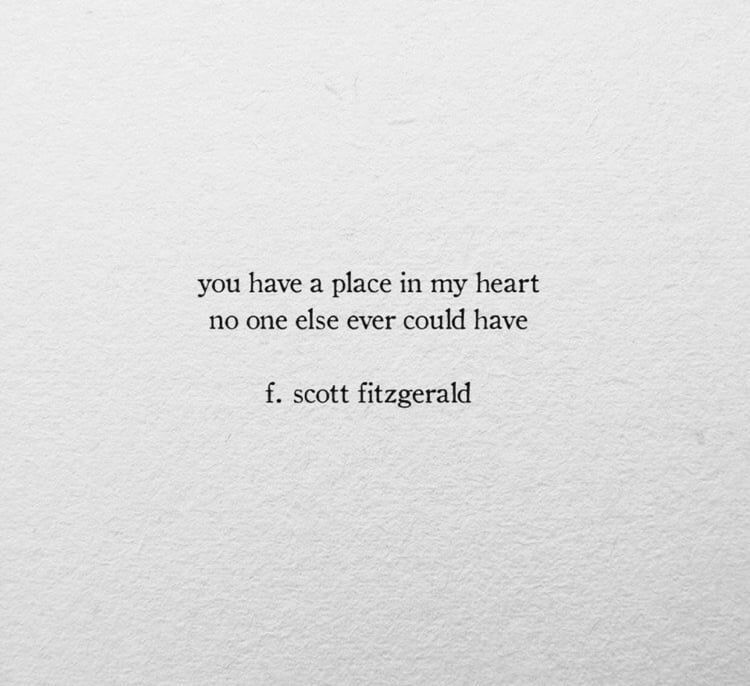 If you answered the same to yourself, then you are absolutely right: like most people, you are most likely really good at explaining everything. The problem is different: the way we imagine our cognitive processes often has nothing to do with reality.
If you answered the same to yourself, then you are absolutely right: like most people, you are most likely really good at explaining everything. The problem is different: the way we imagine our cognitive processes often has nothing to do with reality.
Scientists realized this about 50 years ago: in 1977, Richard Nisbett and Timothy Wilson published a historic article with a telling title: "Telling more than we can know: Verbal reports on mental processes." In it, the authors shared the data of several experiments. All of them pointed out that our explanations of our own feelings, actions and decisions almost always sound logical, but sometimes turn out to be quite far from the truth.
Interpreting your decisions and actions
In 1931, Norman Mayer conducted a series of elegant experiments in which subjects were asked to solve a spatial problem. Two ropes hung from the ceiling of the laboratory, which had to be tied together. The problem was that they hung at a great distance from each other, so that by grabbing the end of one rope, a person could not reach the other.
First, the subjects tried several simple options: for example, tie two ropes together with a third cord. But the experimenter kept asking them to find another solution. When the subjects already despaired, sat down on a stool and thought deeply, the experimenter walked around the laboratory and, as if by chance, touched one of the ropes so that it began to swing. On average, 45 seconds after that, most of the subjects jumped up, struck by the idea. They tied some load to the end of one rope, swung it, pulled the second rope and waited for the end of the first to reach them.
When asked by the experimenter “How did you guess?” people answered very differently: “It dawned on me”, “I just went through everything”, “That was the only solution”. One subject even constructed a whole story on the go:
After going through all the options, I came to rocking. I thought about a situation where, by swinging, you can cross the river. I imagined monkeys swinging from branches. This picture surfaced at the same time as the solution. The idea looked complete.
This picture surfaced at the same time as the solution. The idea looked complete.
It was statistically quite obvious that it was the random swinging of the rope that prompted the subjects to make a decision. But none of them just noticed.
Similar results were observed in experiments with cue words: the subjects were given to memorize pairs of words, for example, "tree / forest" or "ocean / moon". They were then asked to quickly name any laundry detergent. Subjects (English speakers) in the ocean-moon group were twice as likely to name Tide powder. It seems intuitively clear that this is a matter of simple association: the word tide means "tide", which is directly related to the ocean and the moon. However, when asked why they named Tide specifically, people confidently said something completely different, for example: tide has a beautiful box, this is the most famous powder, my mother uses it, and so on.
What is interesting here is not only that people may not notice how they actually arrive at answers and solutions, but also how readily and quickly they construct realistic explanations. This, by the way, was noticed by Freud: once he heard from a doctor friend a story that, with the light hand of grandfather Sigmund, became an anecdote and entered the annals of psychoanalysis (by the way, this approach is no longer considered scientific today). This anecdote is known as the case of the umbrella. The doctor suggested to his patient under hypnosis that when he wakes up, he will open the umbrella. After the end of hypnosis, the patient actually got up and opened the umbrella. He knew nothing about the suggestion. The doctor asked why he did it, and the man instantly constructed something like "I decided to check if the umbrella works, because it's going to rain outside."
This, by the way, was noticed by Freud: once he heard from a doctor friend a story that, with the light hand of grandfather Sigmund, became an anecdote and entered the annals of psychoanalysis (by the way, this approach is no longer considered scientific today). This anecdote is known as the case of the umbrella. The doctor suggested to his patient under hypnosis that when he wakes up, he will open the umbrella. After the end of hypnosis, the patient actually got up and opened the umbrella. He knew nothing about the suggestion. The doctor asked why he did it, and the man instantly constructed something like "I decided to check if the umbrella works, because it's going to rain outside."
Interpreting their emotions
In one early experiment, people with herpetophobia (fear of snakes, lizards, and other reptiles) were asked to rate how much they were frightened by images of various snakes. Between the demonstration of photos, they were still lightly shocked (what a wonderful experiment!), And before each shock, a warning message “SHOCK!” appeared on the screen.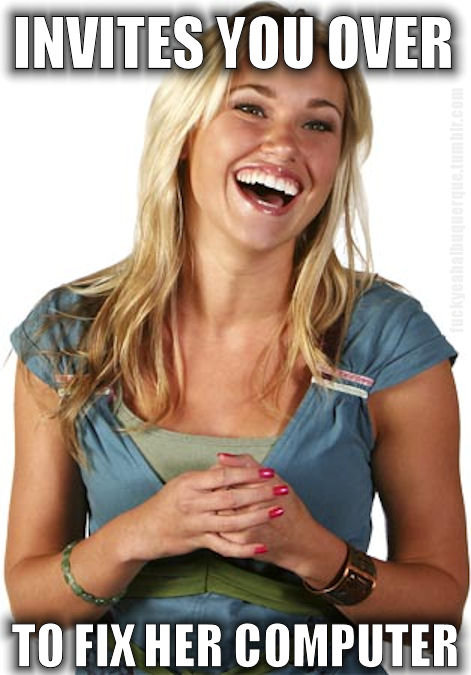
An apparatus was connected to the subjects, with the help of which they heard the beating of their heart. They could quite clearly hear that every time the word "SHOCK" appeared, their pulse quickened in anticipation of an electric shock. When snakes were shown to people, the pulse, as a rule, was less frequent. Of course, the less often the pulse was, the lower people later assessed their fear.
Everything would be fine and logical, but only the heartbeat was a fake - it did not coincide with the real pulse of the subjects. This "pulse" was programmed to sound more often on the word SHOCK - and less often on snakes. Oddly enough, people did not notice the change. They believed that this was a real reaction of their body, and, apparently, unconsciously compared the pulse at the sight of a snake with the pulse at the word SHOCK. And since the heart rate was lower on the snakes, the subjects concluded that they were not so afraid of snakes - at least less than they were afraid of the current.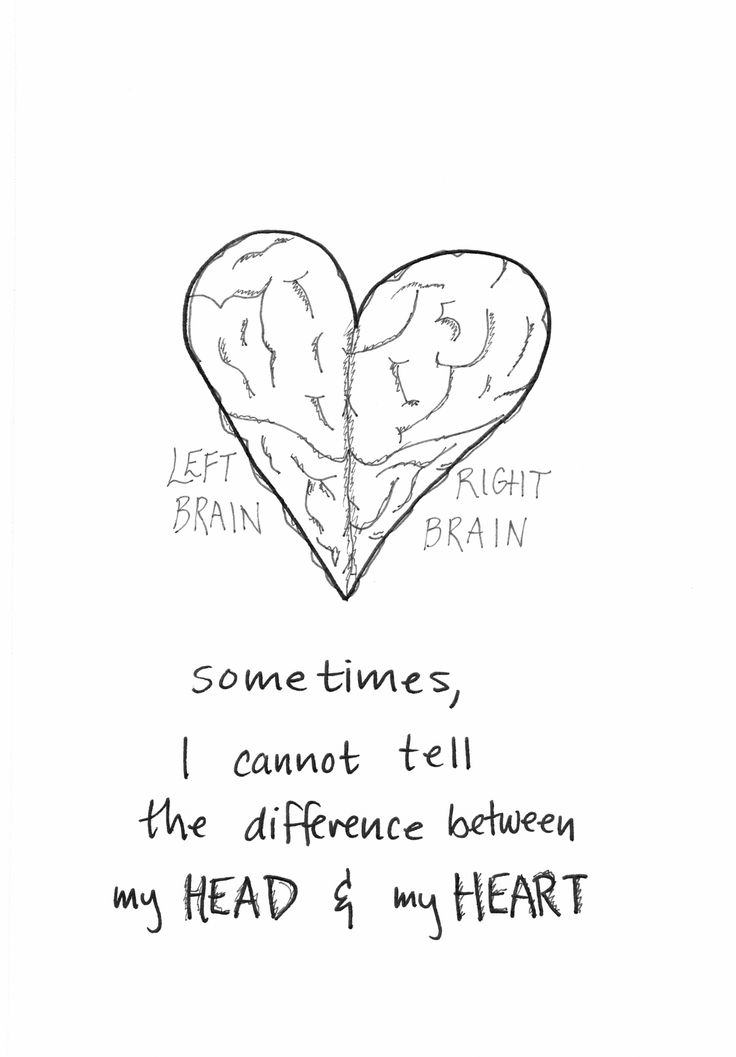
And what do you think - after this experiment, the snakes were no longer so unpleasant to the subjects than before: despite the phobia, they were even ready to come closer to them. That is, during a short experiment with a fake heartbeat, people were “taught” a little easier to relate to snakes, which they had been afraid of all their lives. It is not known how long the effect lasted - but in laboratory conditions it was obvious. That is, instead of directly observing their feelings, people focused on their external manifestations - in this case, also fake ones.
Attributing causes: the placebo effect
In the 1960s, electric current was a psychologist's best friend. In another study, the subjects also received electric shocks - also of increasing intensity. Moreover, they were allowed to decide for themselves what intensity of current they were ready to endure. Before the experiment, half of the subjects were given a pill (actually a placebo) and described what effect this pill would have on them: they were promised a rapid heartbeat, respiratory failure, hand tremors and "butterflies" in the stomach (all these symptoms are the usual sensations from electric shocks).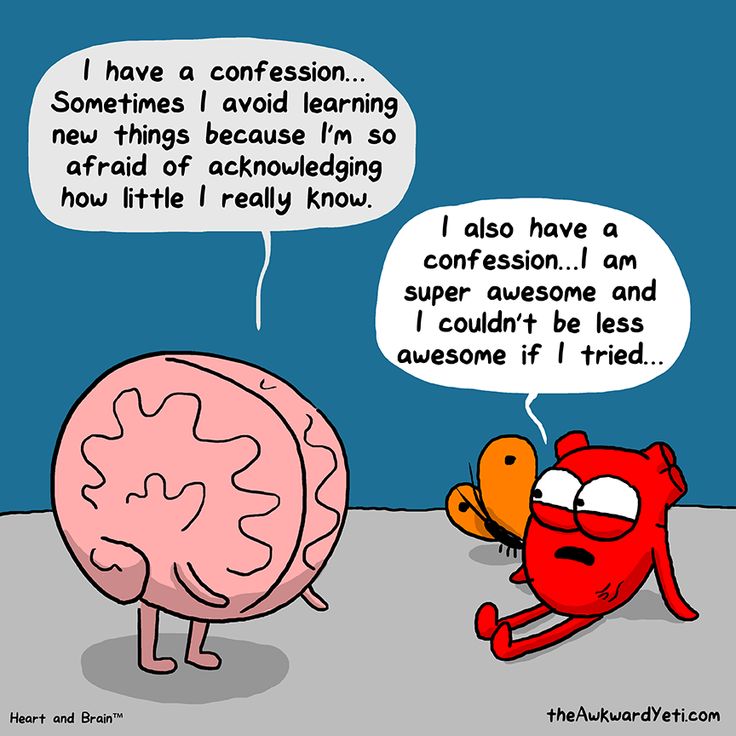
Something interesting happened next. The subjects who took the pill physically felt the same as the group without the pill - the same tremor and palpitations. But, thinking it was the effect of the pill, they were willing to take four times as much electric shock as the group without the pill. This effect is familiar to us in everyday life: we call it "you can't change circumstances, change your attitude towards them." Only in the experiment, people didn’t even have to change anything on purpose - they simply didn’t know that all the unpleasant sensations were actually connected with the current, and not with the pill.
The main result, however, was different. The people in the pill group were asked after the experiment: “You took four times more current than the average subject. Can you explain why?" People answered something like this: “God, I don’t even know ... well, when I was 13 or 14 years old, I collected radios, maybe I got used to electric shocks then ...” Even when then the subjects were told about the essence of the experiment and the hypothesis, they shrugged their shoulders and said, “Very interesting.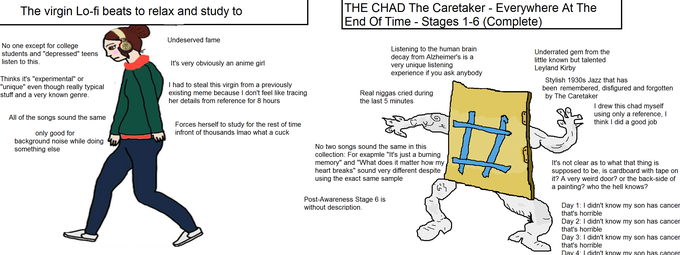 Yes, that's probably how it should be for many. But I still didn’t have that.”
Yes, that's probably how it should be for many. But I still didn’t have that.”
And some more placebo
Similar results were obtained in an experiment with patients with insomnia. They were also given a pill (and also a placebo), asked to take it before bedtime, and warned that the pill would make them agitated, increase their breathing and pulse rate. Curiously, the researchers expected these subjects to fall asleep more easily than the subjects in the control group. Their logic was this: after taking a placebo, people would unconsciously attribute their insomnia symptoms to the pill, rather than anxiety and worries about life, as they usually do.
That's how it all happened. But more importantly, the “attribution” went completely past the consciousness of the subjects: a week later, when the experimenters asked why they began to fall asleep better, they gave a variety of reasons: they made up with a girl, passed a difficult exam, or it’s actually always easier for them to fall asleep in the second half of the week.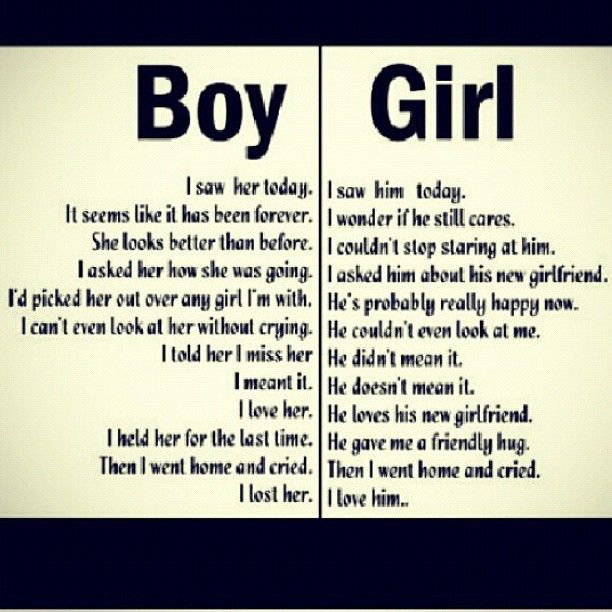
The main conclusion from all these studies is this: The construction of reasons for our actions does not require special effort - it happens easily, quickly and unconsciously. And most importantly, our explanations do not always reflect the real causes and mental processes.
Theories of everything
Based on the collected data (and there were much more of them than listed here), Nisbett and Wilson in the 1977 work already mentioned by us formulated an important concept: a priori causal theories, which can be translated as a priori causal theories theories. It seems that we usually do not have direct access to our feelings, thought processes and reasons for actions. Nevertheless, we willingly talk about them and explain them convincingly in the ways that are available to us.
In our culture (for example, in a country) or subculture (for example, in a family), there are many everyday theories about how everything in life works and what leads to what. These theories are transmitted through films and books, gossip and stories, proverbs and sayings, language turns, and simply in the daily exchange of information. For example, “Ana was given flowers, that’s why she is happy all day”, “Semyon was just paid, so he agreed to participate”, “Love works wonders”, “Seven nannies have a child without an eye”, or “I got up on the wrong foot”. On the basis of such everyday theories, we learn to explain what happens both to the people around us and to ourselves.
These theories are transmitted through films and books, gossip and stories, proverbs and sayings, language turns, and simply in the daily exchange of information. For example, “Ana was given flowers, that’s why she is happy all day”, “Semyon was just paid, so he agreed to participate”, “Love works wonders”, “Seven nannies have a child without an eye”, or “I got up on the wrong foot”. On the basis of such everyday theories, we learn to explain what happens both to the people around us and to ourselves.
Some of these theories are true, some are not, and some are far from the truth. Sometimes we don't see causal relationships right under our noses: for example, how sleep, food, weather, and physical activity affect our condition. Back in 1983, scientists found that on sunny days people consider their lives to be better and happier than on gloomy ones, but no one attributes this to the weather - instead, people give quite reasonable explanations for their assessment. True, once you tell them about the influence of weather on the interpretation of events, the effect disappears. In another study, people watched an erotic movie and found it more arousing if they exercised before watching it—but, of course, they didn't know about this effect, but attributed it to the content of the movie. More recent research shows that hunger is a common cause of irritation, but we do not always attribute the cause to it - admit it, which of you, in a moment of irritation, was not sure that everyone around was just idiots? Now much is being studied about the effect of sleep on the emotional state - for example, it has been established that lack of sleep can cause depression and suicidal thoughts.
In another study, people watched an erotic movie and found it more arousing if they exercised before watching it—but, of course, they didn't know about this effect, but attributed it to the content of the movie. More recent research shows that hunger is a common cause of irritation, but we do not always attribute the cause to it - admit it, which of you, in a moment of irritation, was not sure that everyone around was just idiots? Now much is being studied about the effect of sleep on the emotional state - for example, it has been established that lack of sleep can cause depression and suicidal thoughts.
But you must admit that we often explain our depressed state by failures in life than by the fact that we simply did not get enough sleep. All these examples show that simple, obvious and often correct explanations of one’s own emotional states (didn’t eat, didn’t get enough sleep) lose out to complex a priori theories (“if you analyze it, I never achieved anything in my life”) - it seems because simple no one taught us explanations.
Everyday a priori theories solve an important problem: they give us the feeling that we understand ourselves well and always know what is happening to us. So the first lesson about the heart and mind is that the mind is deceptive: explaining our own decisions or actions often sounds logical, but is not often the true reason for them.
In the next part, we will talk about who science inherited the “worship of reason”, how scientists imagined human thinking until the end of the 20th century, and how the “affective revolution” of the 1980s changed this picture.
Lena Brandt, Maina Miletich, telegram channel "PhD in Psychology"
What if you choose a man with your mind and not with your heart?
What if you choose …
-
Why do I need a man if he didn't get better?
14,493 answers
-
Is it worth trying to live together?
413 answers
-
Question to mistresses: why are you doing this?
16,989 answers
-
How to recognize a gigolo?
4 144 answers
-
Love of a student for a teacher… Forbidden fruit is sweet0096 Help to break up with a married man
9 867 answers
-
Why have men forgotten how to care?
9 536 answers
-
I can’t survive without a man
4 778 answers
-
Men will convey that they sowed
- 9000 9000 9009
4 118 responses
27 responses
Last - Go to
#2
hare
who has this experience? the guy is an ideal candidate for husbands, but I don’t have any kind of spark for him.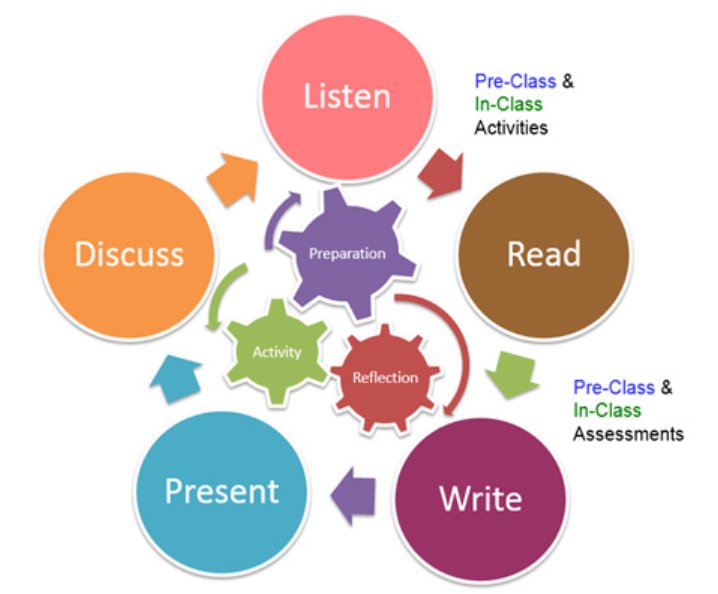
#3
#4
#4
#5
#7
#8
#10
#11
#12
9000 #13,0004
#15
Elenochka
I always thought that the best husband is, first of all, a good friend. Passion passes, and the kinship of souls and respect is always valued, this is harmony in the family
Passion passes, and the kinship of souls and respect is always valued, this is harmony in the family
#16
9000 #17
#18
#19
Guest
Of course get married. Waiting for passions is stupid, also because the heart is very illegible, very often drawn to those that are completely unsuitable not for a family, nor for relationships. You look at him - well, a moral bastard, how can you love such a person, but the heart sees everything differently ....
#22
#23
Guest 5
You know, I had feelings for a person with whom I lived for 3 years. But he didn’t make me an offer, he didn’t particularly want children, he was pursuing a career. And suddenly a man appeared in his life who had strong feelings FOR ME. Absolutely not my type, no spark, strange communication. But it was simply impossible not to accept it over time. Choosing between love and be loved, I chose the second for the first time, and I did not regret it. Now I have a good family, a loving man nearby, stability in the end. I have deep respect for my husband, who saw in me a woman for love, for family, for happiness. Yes, we did not have passions and I got used to it for more than one year, but over time I realized how lucky I was
But he didn’t make me an offer, he didn’t particularly want children, he was pursuing a career. And suddenly a man appeared in his life who had strong feelings FOR ME. Absolutely not my type, no spark, strange communication. But it was simply impossible not to accept it over time. Choosing between love and be loved, I chose the second for the first time, and I did not regret it. Now I have a good family, a loving man nearby, stability in the end. I have deep respect for my husband, who saw in me a woman for love, for family, for happiness. Yes, we did not have passions and I got used to it for more than one year, but over time I realized how lucky I was
#24
mouse+
This is not a choice of intelligence, but of desperation that you will never meet anyone else who would pay attention to you. The intentional creation of unpleasant conditions of existence for oneself cannot be a manifestation of the mind.
#25
Guest
mouse+
This is not a choice of intelligence, but of desperation that you will never meet anyone else who would pay attention to you. The intentional creation of unpleasant conditions of existence for oneself cannot be a manifestation of the mind.
That's when he gets out for a long time, waiting for love, it's not clear what, then despair will come. And if the mind is turned on, there is no despair.
#26
Woman.ru experts
Aleshina Maria
Psychologist
36 answers
Anna Antonchik
Female psychologist
160 responses
Vladimir Titarenko
Fitness nutritionist
162 answers
Tokar Darya Anatolyevna
Fitness trainer
51 answers
International Institute
Psychology, psychotherapy,.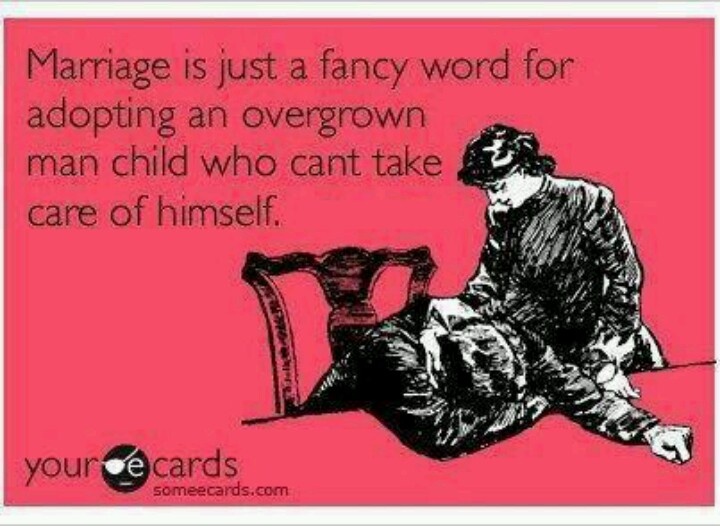 ..
..
9 answers
Maria Burlakova
Psychologist
335 answers
Maxim Sorokin
Practicing psychologist
1 051
Maria Sinyapkina
Psychologist-Sexologist
92 answers
Maria Kremenetskaya
Speech therapist - defectologist
44 answers
Ivanova Svetlana
Coach
78 answers
#27
hare
who has this experience? the guy is an ideal candidate for husbands, but I don’t have any kind of spark for him. You definitely won’t meet this more in life .. I’m pleased with him and it’s good, but there is no storm, my heart does not jump out of my chest .. some kind of warm kindred feeling only. Serious intentions, ready to go to the registry office even now .. but will he endure and fall in love?
You definitely won’t meet this more in life .. I’m pleased with him and it’s good, but there is no storm, my heart does not jump out of my chest .. some kind of warm kindred feeling only. Serious intentions, ready to go to the registry office even now .. but will he endure and fall in love?
#28
Guest
That's when he gets out for a long time, waiting for love, it's not clear what, then despair will come. And if the mind is turned on, there is no despair.
#29
author
this is how it started to be written off from me, also after a long relationship all this, and such a contrast in people's attitude towards me..this guy just idolizes me. and absolutely the same "not my type, no spark, strange communication", I would like to believe that if I choose it, it will continue to be like you))
#30
Invented stories
-
I am infuriated with my children and grandchildren .
 ..
.. 1 313 answers
- 9000
. that all the property is registered to the children
1,000 answers
-
Such a salary - I don’t want to work
653 answers
-
2 years long lie. How to destroy?
923 answers
-
Husband left, 2 months of depression... How will you cope if you are left all alone?
197 answers
#31
New topics per day:
-
I do not feel happy with
1 1 answer
-
Dating sites
7 answers
-
Goes to a birthday party where the ex will be
6 answers
-
For a man when meeting.

Learn more

